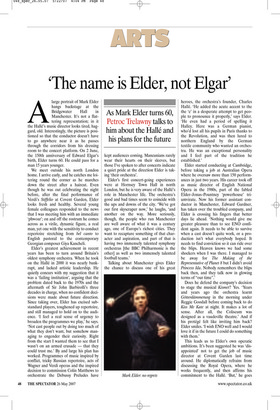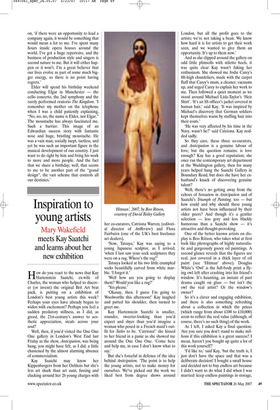‘The name is Elder, not Elgar’
Alarge portrait of Mark Elder hangs backstage at the Bridgewater Hall in Manchester. It’s not a flattering representation; in it the Hallé’s music director looks tired, haggard, old. Interestingly, the picture is positioned so that the conductor doesn’t have to go anywhere near it as he passes through the corridors from his dressing room to the concert platform. On 2 June, the 150th anniversary of Edward Elgar’s birth, Elder turns 60. He could pass for a man 15 years younger.
We meet outside his north London home. I arrive early, and he catches me loitering round the corner as he marches down the street after a haircut. Even though he was out celebrating the night before, after the final performance of Verdi’s Stiffelio at Covent Garden, Elder looks fresh and healthy. Several young female colleagues responded to the news that I was meeting him with an immediate ‘phwoar’; on and off the rostrum he comes across as a virile, dynamic figure, a real man, yet one with the sensitivity to conduct repertoire stretching from bel canto to English pastoral to the contemporary Georgian composer Giya Kancheli.
Elder’s greatest achievement in recent years has been to turn around Britain’s oldest symphony orchestra. When he took on the Hallé in 2000 it was nearly bankrupt, and lacked artistic leadership. He quietly concurs with my suggestion that it was a ‘failing institution’, arguing that the problem dated back to the 1970s and the aftermath of Sir John Barbirolli’s three decades in charge, when no confident decisions were made about future direction. Since taking over, Elder has excised substandard players, toughened up repertoire, and still managed to hold on to the audience. ‘I feel a real sense of urgency to broaden the programmes we play,’ he says. ‘Not cast people out by doing too much of what they don’t want, but somehow managing to engender their curiosity. Right from the start I wanted them to see that I wasn’t on an armed crusade — that they could trust me.’ By and large his plan has worked. Programmes of music inspired by conflict, tricky Russian repertoire, acts of Wagner and Verdi operas and the inspired decision to commission Colin Matthews to orchestrate the Debussy Preludes have kept audiences coming. Mancunians rarely wear their hearts on their sleeves, but those I’ve spoken to after concerts indicate a quiet pride at the direction Elder is taking ‘their orchestra’.
Elder’s first concert-going experiences were at Hornsey Town Hall in north London, but he is very aware of the Hallé’s role in Manchester life. The orchestra’s good and bad times seem to coincide with the ups and downs of the city. ‘We’ve got our first skyscraper now,’ he laughs, ‘and another on the way. More seriously, though, the people who run Manchester are well aware of what it was a century ago, one of Europe’s richest cities. They want to recapture something of that character and aspiration, and part of that is having two immensely talented symphony orchestras [the BBC Philharmonic is the other] as well as two immensely talented football teams.’ Talking about Manchester gives Elder the chance to discuss one of his great heroes, the orchestra’s founder, Charles Hallé. ‘He added the acute accent to the the ‘e’ in a desperate attempt to get people to pronounce it properly,’ says Elder. ‘He even had a period of spelling it Halley. Here was a German pianist, who’d lost all his pupils in Paris thanks to the Revolution, and was then lured to northern England by the German textile community who wanted an orchestra. He was an exceptional personality and I feel part of the tradition he established.’ Elder started conducting at Cambridge, before taking a job at Australian Opera where he oversaw more than 150 performances in just two years. His career took off as music director of English National Opera in the 1980s, part of the fabled Elder–Jonas–Pountney ‘powerhouse’ triumvirate. Now his former assistant conductor in Manchester, Edward Gardner, has taken over the troubled company, and Elder is crossing his fingers that better days lie ahead. ‘Nothing would give me greater pleasure than to see ENO confident again. It needs to be able to survive when a cast doesn’t quite work, or a production isn’t what everybody hoped. It needs to find conviction so it can ride over the blips. Heaven knows we had some shockers when I was there. I managed to be away for The Making of the Representative of Planet 8 but I didn’t avoid Princess Ida. Nobody remembers the blips back then, and they talk now in glowing terms of “our time”.’ Does he defend the company’s decision to stage the musical Kismet? Yes. ‘Years and years ago the orchestra learnt Götterdämmerung in the morning under Reggie Goodall before coming back to do Kiss Me Kate at night. It makes a lot of sense. After all, the Coliseum was designed as a vaudeville theatre.’ And if his protégé felt like inviting him back? Elder smiles. ‘I wish ENO well and I would love it if in the future I could do something with them.’ This leads us to Elder’s own operatic ambitions. It’s been suggested he was ‘disappointed’ not to get the job of music director at Covent Garden last time around. He diplomatically refrains from discussing the Royal Opera, where he works frequently, and then affirms his commitment to the Hallé. ‘But,’ he goes on, ‘if there were an opportunity to lead a company again, it would be something that would mean a lot to me. I’ve spent many hours inside opera houses around the world, I’ve got a huge repertoire, and the business of production style and singers is second nature to me. But it will either happen or it won’t. I’m a great believer that our lives evolve as part of some much bigger energy, so there is no point having regrets.’ Elder will spend his birthday weekend conducting Elgar in Manchester — the cello concerto, the 2nd symphony and the rarely performed oratorio The Kingdom. ‘I remember my mother on the telephone when I was a child patiently explaining, “No, no, no, the name is Elder, not Elgar.” The moustache has always fascinated me. Such a barrier. This image of an Edwardian success story with fantastic nose and huge, bristling moustache. He was a vain man, socially inept, tactless, and yet he was such an important figure in the musical development of our country. I just want to do right by him and bring his work to more and more people. And the fact that we share a birthday; well, that seems to me to be another part of the “grand design”, the vast scheme that controls all our destinies.’



















































































 Previous page
Previous page